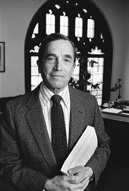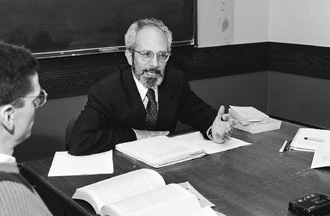Syllabus
 No
surprises here. "The syllabus is simple," Ralph Lerner
announces. "All we're reading is Macbeth and Richard
III. The title is grander than the performance." Lerner
and Nathan Tarcov, with whom he's team teaching Shakespeare on
Tyranny, have a decided preference in texts. "We have an
edition," says Lerner, holding up a yellow-and-red paperback.
"It's this one. Get this one." Tarcov elaborates, "Reading
a Shakespeare play in the Arden edition is really a different
experience-you learn the play in a different way." The Arden
Shakespeare-in which Macbeth is edited by Kenneth Muir
and and King Richard III by Antony Hammond-offers appendices
of commentary and voluminous footnotes (a page with five lines
of the Bard to 90 lines of enlightening notes is not uncommon).
No
surprises here. "The syllabus is simple," Ralph Lerner
announces. "All we're reading is Macbeth and Richard
III. The title is grander than the performance." Lerner
and Nathan Tarcov, with whom he's team teaching Shakespeare on
Tyranny, have a decided preference in texts. "We have an
edition," says Lerner, holding up a yellow-and-red paperback.
"It's this one. Get this one." Tarcov elaborates, "Reading
a Shakespeare play in the Arden edition is really a different
experience-you learn the play in a different way." The Arden
Shakespeare-in which Macbeth is edited by Kenneth Muir
and and King Richard III by Antony Hammond-offers appendices
of commentary and voluminous footnotes (a page with five lines
of the Bard to 90 lines of enlightening notes is not uncommon).

There
are two optional movie nights. The Macbeth night begins
with Piper Laurie as Lady Macbeth (1981) then switches in mid-play
to the Ian McKellen-Judi Dench version (1979). A Richard III
smorgasbord includes Olivier's and McKellen's deliveries of
Richard's opening soliloquy ("Now is the winter of our discontent…")
as a prelude to the 1983 BBC production.
No
tests take up class time. Undergrads have two writing assignments:
one paper of no more than 1,500 words and another, a month later,
of no more than 2,500 words on topics suggested or approved by
the instructors. Among the suggested topics for the first are:
"How do you understand the supernatural appearance in Macbeth?
Are evil and tyranny something natural or supernatural?"
Grad students first propose topics and then write papers (no more
than 4,000 words), due at quarter's end.
-
M.R.Y.

![]()
 No
surprises here. "The syllabus is simple," Ralph Lerner
announces. "All we're reading is Macbeth and Richard
III. The title is grander than the performance." Lerner
and Nathan Tarcov, with whom he's team teaching Shakespeare on
Tyranny, have a decided preference in texts. "We have an
edition," says Lerner, holding up a yellow-and-red paperback.
"It's this one. Get this one." Tarcov elaborates, "Reading
a Shakespeare play in the Arden edition is really a different
experience-you learn the play in a different way." The Arden
Shakespeare-in which Macbeth is edited by Kenneth Muir
and and King Richard III by Antony Hammond-offers appendices
of commentary and voluminous footnotes (a page with five lines
of the Bard to 90 lines of enlightening notes is not uncommon).
No
surprises here. "The syllabus is simple," Ralph Lerner
announces. "All we're reading is Macbeth and Richard
III. The title is grander than the performance." Lerner
and Nathan Tarcov, with whom he's team teaching Shakespeare on
Tyranny, have a decided preference in texts. "We have an
edition," says Lerner, holding up a yellow-and-red paperback.
"It's this one. Get this one." Tarcov elaborates, "Reading
a Shakespeare play in the Arden edition is really a different
experience-you learn the play in a different way." The Arden
Shakespeare-in which Macbeth is edited by Kenneth Muir
and and King Richard III by Antony Hammond-offers appendices
of commentary and voluminous footnotes (a page with five lines
of the Bard to 90 lines of enlightening notes is not uncommon).